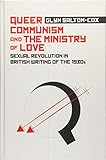Queer Communism and the Ministry of Love : Sexual Revolution in British Writing of the 1930s / Glyn Salton-Cox.
Material type: TextPublisher: Edinburgh : Edinburgh University Press, [2022]Copyright date: ©2018Description: 1 online resource (240 p.)Content type:
TextPublisher: Edinburgh : Edinburgh University Press, [2022]Copyright date: ©2018Description: 1 online resource (240 p.)Content type: - 9781474423311
- 9781474423328
- 820.9/353
- online - DeGruyter
| Item type | Current library | Call number | URL | Status | Notes | Barcode | |
|---|---|---|---|---|---|---|---|
 eBook
eBook
|
Biblioteca "Angelicum" Pont. Univ. S.Tommaso d'Aquino Nuvola online | online - DeGruyter (Browse shelf(Opens below)) | Online access | Not for loan (Accesso limitato) | Accesso per gli utenti autorizzati / Access for authorized users | (dgr)9781474423328 |
Frontmatter -- Contents -- Acknowledgments -- Introduction: The Perverts of Modernity -- Chapter 1 Boy Meets Camera: Christopher Isherwood and Sergei Tretiakov -- Chapter 2 Sylvia Townsend Warner’s Queer Vanguardism -- Chapter 3 The Hymning of Heterosexuality: Katharine Burdekin and the Popular Front -- Chapter 4 Orwell’s Hope in the Proles -- Coda: A Little Window for the Bourgeoisie -- Notes -- Index
restricted access online access with authorization star
http://purl.org/coar/access_right/c_16ec
Provides a detailed examination of a distinctive crossroads in the history of the left Queer Communism reconstructs queer writers’ engagements with a series of wide-ranging Marxist aesthetic debates, social forms and political strategies. Through case studies of Christopher Isherwood and Sylvia Townsend Warner, Salton-Cox argues that queer writing of the 1930s was deeply embedded in a network of transnational leftist formations stretching across Weimar Germany, Soviet Russia, Spain and China. Probing the left’s mounting heteronormativity in the late 30s and 40s in chapters on Katharine Burdekin and George Orwell, Queer Communism also traces the genesis of post-war sexual politics in Popular Front antifascism. Salton-Cox’s study transforms current narratives of mid-century literary, cultural and intellectual history from a queer Marxist perspective.Key Features:Rearticulates major figures with lesser known authorsA unique exploration of the transnational formation of queer leftist writing in 1930s Britain informed by detailed research on Weimar Berlin, British , and the Soviet UnionA queer Marxist critique of anti-fascist fiction and the sexual politics of midcentury BritainRedefines our understanding of 1930s literary history, queer theory, and Marxism
Mode of access: Internet via World Wide Web.
In English.
Description based on online resource; title from PDF title page (publisher's Web site, viewed 29. Jun 2022)


